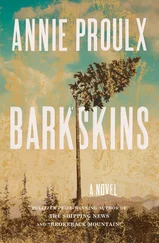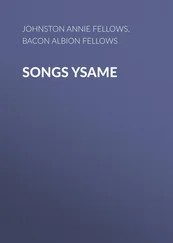Yet he thought this was the best part of his life. It was as if he’d come into flat water after half a century and more of running the rapids. He was glad to put the paddle down and float the rest of the way.
He had his secret places hidden all through Chopping County and he visited them like stations of the cross; in order, and in reverence in expectation of results. In late May he followed the trout up the narrow, sun-warmed streams, his rod thrusting skillfully through the alders, crushing underfoot ferns whose broken stems released an elusive bitter scent. In October, mists came down on him as he waded through drenched goldenrod meadows, alert for grouse. And in the numb silence of November Hawkheel was a deer hunter up on the shoulder of Antler Mountain, his back against a beech while frozen threads of ice formed on the rifle’s blue metal.
The deer hunt was the end and summit of his year: the irrevocable shot, the thin, ringing silence that followed, the buck down and still, the sky like clouded marble from which sifted snow finer than dust, and the sense of a completed cycle as the cooling blood ran into the dead leaves.
Bill Stong couldn’t leave things alone. All through their lives there had been sparks and brushfires of hatred between Hawkheel and him, never quite quenched, but smoldering low until some wind fanned up the little flames.
In school Hawkheel had been The Lone Woodsman, a moody, insubordinate figure prowling the backcountry. Stong was a wiseacre with a streak of meanness. He hunted with his father and brothers and shot his first buck when he was eleven. How could he miss, though woman-raised Hawkheel bitterly, how, when he sat in a big pine right over a deer trail and his old man whispered “Now! Shoot now!” at the moment?
Stong’s father farmed a little, ran a feed store and got a small salary to play town constable. He broke up Saturday-night dance fights, shot dogs that ran sheep and sometimes acted as the truant officer. His big, pebbled face was waiting for Hawkheel one school morning when he slid down the rocks to a trout pool.
“Plannin’ to cut school again? Well, since your old man’s not in a position to do it for you, I’m going to give you a lesson you’ll remember.” He flailed Hawkheel with a trimmed ash sapling and then drove him to school.
“You don’t skip no more school, buddy, or I’ll come get you again.”
In the classroom Bill Stong’s sliding eyes told Hawkheel he had been set up. “I’ll fix him,” Hawkheel told his sister, Urna, at noon. “I’ll think up something. He won’t know what hit him when I’m done.” The game began, and the thread of rage endured like a footnote to their lives.
In late October, on the Sunday before Stong’s fifteenth birthday, an event that exposed his mother’s slovenly housekeeping ways took his family away.
Chopping County farmers soaked their seed corn in strychnine to kill the swaggering crows that gorged on the germinating kernels. One of the Stongs, no one knew which one, had mixed the deadly solution in a big roasting pan. The seed was sown and the unwashed pan shoved beneath the blackened iron griddles on the pantry floor where it stayed until autumn hog butchering.
The day was cold and windy, the last of summer thrown up into the sky by turbulent air. Stong’s mother pulled out the pan and loaded it with a pork roast big enough to feed the Sunday gathering of family. The pork killed them all except Bill Stong, who was rolling around in Willard Iron’s hayloft on a first shameful adventure. The equation of sex and death tainted his adolescent years.
As Stong grew older, he let the farm go down. He sat in the feed store year after year listening in on the party line. His sharp-tongued gossip rasped at the shells of others’ lives until the quick was exposed. At the weekend dances Stong showed up alone, never dancing himself, but watching the women gallop past, their print blouses damp with sweat under the arms, their skirts sticking to their hot legs. At night he walked through town seeing which ones left the window shades up. He went uninvited to church suppers and card parties, winked out juicy tales and stained the absent with mean innuendo. Often his razor tongue stropped itself on the faults and flaws of his dead parents as though he had come fresh from a rancorous argument with them, and at other times he called them saints in a tearful voice.
Stong caught Hawkheel with petty tricks again and again. After Hawkheel started farming, once or twice a year he found mailbox the knocked over, water in the tractor’s gas tank or the gate opened so the cows got onto the highway. He knew who’d done it.
Still, he kept on buying grain at the feed store until Stong told him about Josepha. Stong’s eyes shone like those of a greedy barn cat who has learned to fry mice in butter.
“Hell, everybody in town knows she’s doin’ it but you,” he whispered. He ate Hawkheel up with his eyes, sucked all the juice out of his sad condition.
It was cold in the store and the windows were coated with grain dust. Hawkheel felt the fine powder between his fingers and in his dry mouth. They stared at each other, then Stong scurried out through the chilly passageway that led to the house.
“He’s got something coming now,” said Hawkheel to Urna. “I could wire him up out in the woods and leave him for the dogs. I could do something real bad to him any time, but I want to see how far he goes.”
Stong had sour tricks for everybody. Trade dropped away at the feed store, and there were some, like Hawkheel, who spat when they saw the black pickup heading out of town, Stong’s big head turning from side to side to get his fill of the sights before the woods closed in.
For a long time Urna made excuses for Stong, saying that his parents’ death had “turned” him, as though he were a bowl of milk gone sour in thundery weather. But when Stong told the game warden there was a summer doe in her cellar she got on the phone and burned Hawkheel’s ear.
“Leverd, what kind of a man turns in his neighbor over some deer meat he likes to eat just as good as anybody?”
Hawkheel had an answer, but he didn’t give it.
A few years after Josepha left, Hawkheel began to slide deep into the books. He was at Mosely’s auction hoping the shotguns would come up early so he could get out of the crowd and take off. But it dragged on, hundreds of the old lady’s doilies and quilts going one by one to the summer people. Hawkheel poked through the boxes on the back porch, away from the noise. A book called Further Adventures of the One-Eyed Poacher sounded good and he dipped into it like a swallow picking mosquitoes off the water, keeping one ear on the auctioneer’s patter. He sat on the broken porch glider and read until the auctioneer, pulling the crowd behind him like a train, came around to the back and shouted “Who’ll give me five dollars for them boxes a books!”
Surrounded in his trailer by those books and the hundreds he’d added to them over the decades, Hawkheel enjoyed his solitude.
Stong, too, was more and more alone up at the store as he got older, his trade dwindled to a few hard-pressed farmers who still bought feed from him because they always had and because Stong carried them until their milk checks came in. Listening in on the phone wasn’t enough now; he interrupted conversations, shouting “Get off the line! I got a emergency.”
“You ask me,” said Urna to Hawkheel, “he’s funny in the head. The only emergency he’s got is himself. You watch, they’ll find him laying on the kitchen floor some day as stiff as a January barn nail.”
“When I get through with him,” said Hawkheel, “he’ll be stiff, all right.”
Stong might have fallen to the cold kitchen linoleum with an iron ringing sound, but in his sixties his hair turned a fine platinum white and his face thinned to show good bones. It was a time when people were coming into the country, buying up the old farmhouses and fields and making the sugarhouses into guest cottages.
Читать дальше












